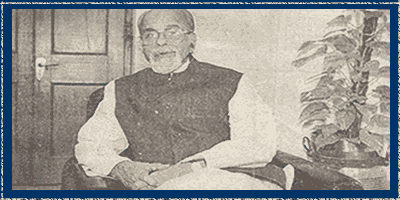|
Inder Kumar Gujral
Prime Minister with a goatee

Memories of his dog named Dyer and his two-roomed classroom
spilling out on the street are some of the things the usually
reticent Inder Kumar Gujral, former prime minister of India,
shares.
S tockholm.
Circa: Late 70s. It took an amenable week-ling stubble and
a beard designer in a hurry to seal the signature look. The
price: five kroners. " I was in Stockholm when a friend suggested
that I go to a beauty salon. I walked into one of the most
famous ones but even before I could utter a word the beard
designer had given me this look," laughs Inder Kumar Gujral,
the former prime minister of India.
In his repertoire of reminiscences, there are many other things
he can laugh at. At a dog named Dyer. Incensed at General
Dyer's brutality in Jalianwala Bagh, Gujral Senior christened
their dog Dyer. It created a flutter in the sleepy town of
Jhelum, the local police took offence but "my father stuck
to it and the dog's name was never changed." At their pony
that would baulk at the sight of incoming trains and "almost
threw me into the Jhelum". At the primary school that spilled
to the streets because the headmaster's family occupied one
of the two rooms.
If there are peels of laughter, there are traces of grief
also. Gujral, just 11 then, bore the brunt of the police when
he participated in a protest march; the family huddled together
when his brother Satish Gujral's illness stretched to five
years and when the other brother Raj met his watery grave
in the Jhelum. Nights were frightening. "Dad would spend days
behind bars and ma would have to deal with loud knocks on
the door." Yes years later, there was also this classmate
who was brighter than him.
Now almost 80, this soft-spoken man with a famed goatee often
smiles at life. He never gets angry or excited, has no fears
and not many unfulfilled dreams. But he was not the bright
man that the gods smiled on: he had the grit to fill empty
spaces within. "It was a time when we did not have too many
options, Jhelum had two primary schools and three cars. I
went to the school run by Master Diwanchand where the medium
of instruction was Urdu. We picked up English much later and
this was a major handicap," he remembers.
From there on life never proceeded like a fairy tale. From
science to commerce and then to a Masters in Economics, Gujral
tried hard to find his moorings. Academics were definitely
not the first priority. His dreams flitted from being a science
graduate to a chartered accountant to taking up law, all this
interspersed with nationalism. Like his parents, Gujral had
taken a plunge in the national movement and books were thrown
on the backburner but it was the 'bright classmate' who maintained
a steady supply of class notes in the jail. Who fared better
in the examination?
"Sheila was always brighter than me and it was her intellect
that appealed to me the most," he says. The two got married
in 1944 on a Sunday, not because it was auspicious but because
his lawyer father hated to miss court even for a day. Not
even for his son's wedding. So the Gujrals stuck to tying
the knot on Sundays with minimum rituals and fewer guests.
Sheila went on to do a diploma in journalism, Gujral headed
the students union, took to export-import of little things,
then policy and diplomacy. He also became the Prime Minister
of India, Sheila wrote 30 books.
At Gujral's home at 5 Janpath nostalgia attaches itself to
other memories - the pain of partition, old nightmares and
throwbacks to the British regime. "I had started a little
export-import business in Karachi but everything was lost
during the partition. We left Pakistan clutching on to our
dreams. It was the worst of times. We were expecting our first
child and there was nowhere to go. Finally we were allotted
a house in Babar Road in New Delhi where three families shared
two rooms."
But he managed to pick up the threads of life. Having had
his fill, Gujral still follows a strict regimen of morning
and evening walks. He prefers vegetarian food, has bananas
for breakfast and coffee at 11:30 in the morning, loves melons,
does all his readings at night and is proud that his family
is a "close-knit" one.
The interview is over. Gujral takes us to the manicured lawns
and shakes hands. I notice something - even the contours of
his wrist are gentle. For once I did not feel like killing
these little details.
|

